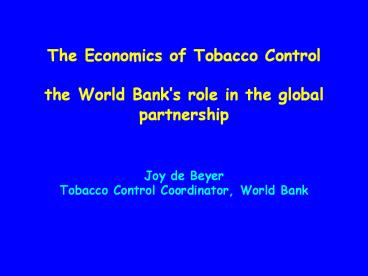The Economics of Tobacco Control the World Bank - PowerPoint PPT Presentation
1 / 16
Title:
The Economics of Tobacco Control the World Bank
Description:
The Economics of Tobacco Control the World Bank s role in the global partnership Joy de Beyer Tobacco Control Coordinator, World Bank The United Nations Ad Hoc ... – PowerPoint PPT presentation
Number of Views:104
Avg rating:3.0/5.0
Title: The Economics of Tobacco Control the World Bank
1
The Economics of Tobacco Controlthe World
Banks role in the global partnershipJoy de
BeyerTobacco Control Coordinator, World Bank
2
The United Nations Ad Hoc Interagency Task Force
on Tobacco ControlUN AgenciesFAO, ICLA,
ILO, IMF, UNAIDS, UNDCP, UNDP, UNDG, UNEP,
UNICEF, UNESCO, UNFPA, UN Secretariat, World
Bank, WHO, WIPO Some other key partners
CDC the US Centers for Disease Control and
Prevention, Office of Smoking and HealthIDRC -
International Development Research Centre (of
Canada)USDA - United States Department of
Agriculture The UN Foundation
3
Curbing the EpidemicGovernments and the
Economics of Tobacco Control
The World Bank
4
The bottom line Modest action by governments
could save millions of lives and prevent much
disease, including -perhaps especially- among
poor people, without long-term harm to most
economies.
5
Change will be slow.Factors that increase or
maintain tobacco use rising incomes
population growth nicotine addiction
consumer choice advertising and promotionThe
global tobacco market will not just wither
away.
6
(No Transcript)
7
Cigarette price and consumption go in opposite
trendsReal price of cigarettes and annual per
adult cigarette consumption in South Africa
1970-1989
8
(No Transcript)
9
Cigarette tax levels are lower in low or
middle-income countries
Source Authors calculations
10
Smuggling is a big problem. High taxes and
price differentials provide an incentive to
smuggle,but other factors are important, e.g
corruptionCoordinated multilateral tax
increases are bestAction against smuggling is a
priority
11
Tobacco smuggling tends to rise in line with the
degree of corruptionSmuggling as a function of
transparency index
Source Merriman and others, background paper
12
(No Transcript)
13
(No Transcript)
14
(No Transcript)
15
(No Transcript)
16
- Governments, multilateral agencies, NGOs and
citizens could together save millions of lives
and improve health, by reducing use of tobacco
products.































